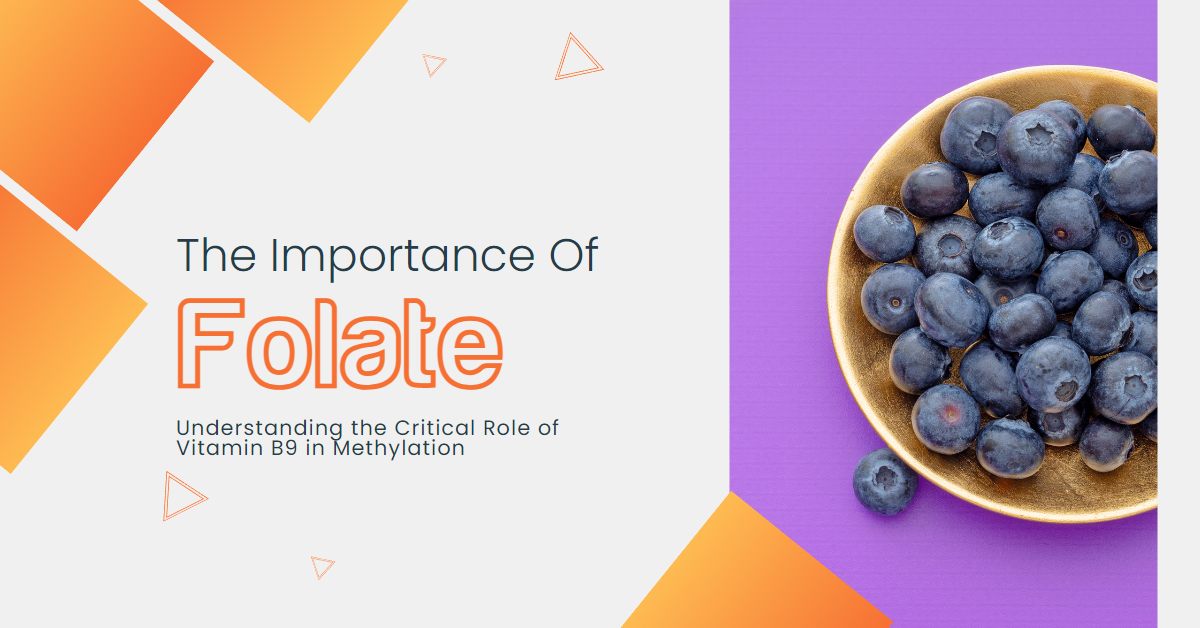Folate, also known as Vitamin B9, is a water-soluble vitamin that is essential for human health. It plays a critical role in many bodily functions, including DNA synthesis, red blood cell formation, and nervous system function. Folate deficiency can lead to a variety of health problems, including anemia, birth defects, and other conditions. In this article, we will discuss the importance of folate and how it is involved in a process called methylation, which is critical for our overall health.
Key Highlights
- Folate, also known as Vitamin B9, is essential for human health and plays a critical role in many bodily functions, including DNA synthesis, red blood cell formation, and nervous system function.
- Folate is involved in a process called methylation, which is critical for many bodily functions, including gene expression, detoxification, and neurotransmitter production.
- Folate deficiency can lead to a variety of health problems, including anemia, and birth defects
What is Folate?
Folate is a B-vitamin that is naturally present in many foods. It is essential for the production of DNA and RNA, the body’s genetic material. Folate also helps in the production of red blood cells, which carry oxygen throughout the body. It is important for proper brain function, and it plays a critical role in the development of the nervous system of a fetus during pregnancy.
Folate is not produced by the body, so it must be obtained through the diet or supplements. The recommended daily intake of folate for adults is 400 micrograms (mcg), and for pregnant women, it is 600 mcg.
Foods that are high in folate include leafy green vegetables, such as spinach and kale, as well as liver, beans, and fortified cereals and grains. Folic acid is the synthetic form of folate found in supplements and fortified foods.
The Role of Folate in Methylation
Methylation is a biochemical process that occurs in the body, in which a molecule called a methyl group is added to another molecule. Methylation is critical for many bodily functions, including gene expression, detoxification, and neurotransmitter production.
Folate plays a critical role in methylation by providing the body with methyl groups. Specifically, folate is involved in the conversion of homocysteine, an amino acid, into methionine, which is necessary for methylation to occur.
If there is not enough folate in the body, the methylation process can be disrupted, which can lead to a variety of health problems.
The Role of Folate in Methylation
Folate is particularly important during pregnancy, as it plays a critical role in the development of the nervous system of the fetus. Folate deficiency during pregnancy can lead to neural tube defects, which are serious birth defects that affect the brain and spinal cord.
It is recommended that women who are planning to become pregnant take a folic acid supplement in addition to consuming a folate-rich diet. The supplement should be taken before pregnancy and during the first trimester to reduce the risk of neural tube defects.
Folate is an essential nutrient that plays a critical role in many bodily functions. It is involved in the methylation process, which is important for gene expression, detoxification, and neurotransmitter production. Folate deficiency can lead to a variety of health problems.
It is important to consume a folate-rich diet and to consider taking a folic acid supplement, particularly during pregnancy. However, it is also important to be cautious about taking high doses of folic acid from supplements, as this may increase the risk of other conditions. As with any nutrient, it is best to obtain folate from a balanced diet, rather than relying solely on supplements.
In addition, it is important to note that not everyone is able to absorb folate properly. Certain genetic variations can impair folate metabolism, leading to folate deficiency despite adequate intake. If you suspect that you may have a folate deficiency, speak with your healthcare provider about testing and treatment options.
Overall, folate is a critical nutrient that is essential for our health and wellbeing. By understanding its importance and ensuring that we are consuming adequate amounts, we can help to support our overall health and reduce the risk of a variety of health problems.
Citation List:
- Bailey, L. B., Stover, P. J., McNulty, H., Fenech, M. F., Gregory, J. F., Mills, J. L., … & Pfeiffer, C. M. (2015). Biomarkers of nutrition for development (BOND)—folate review. The Journal of nutrition, 145(7), 1636S-1680S. https://doi.org/10.3945/jn.114.206599
- James, S. J., Melnyk, S., & Jernigan, S. (2006). Metabolic endophenotype and related genotypes are associated with oxidative stress in children with autism. American Journal of Medical Genetics Part B: Neuropsychiatric Genetics, 141(8), 947-956. https://doi.org/10.1002/ajmg.b.30383
- Mason, J. B. (2013). Biomarkers of nutrient exposure and status in one-carbon (methyl) metabolism. Journal of Nutrition, 143(2), 95-99. https://doi.org/10.3945/jn.112.170993







